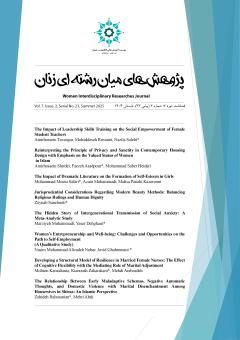Subject Areas :
Zahedeh Rahmanian
1
![]() ,
Mehri Abdi
2
,
Mehri Abdi
2
1 - Assistant Professor, Department of Psychology, Faculty of Psychology and Counseling, Farhangian University, Tehran, Iran
2 - Master's Student, Department of Psychology, Faculty of Psychology, Islamic Azad University of Yasouj, Yasouj, Iran.
Keywords: Early Maladaptive Schemas, Negative Automatic Thoughts, Domestic Violence, Marital Disenchantment, Islamic Perspective.,
Abstract :
Considering the significance of marital interactions in Islam, this study aimed to investigate the relationship between early maladaptive schemas, negative automatic thoughts, and domestic violence with marital disenchantment among housewives in Shiraz, based on an Islamic perspective. The research method was descriptive-correlational using a survey approach. The statistical population consisted of all housewives in Shiraz in the year 2022, from which 384 individuals were selected through convenience sampling. Data were collected using the Early Maladaptive Schemas Questionnaire (Young, 2005), the Negative Automatic Thoughts Questionnaire (Hollon & Kendall, 1980), the Domestic Violence Questionnaire (Haj-Yahya, 1999), and the Marital Disenchantment Scale (Pines et al., 2016). Regression analysis results indicated that the three variables explained 22% of the variance in marital disenchantment. Domestic violence (B = 0.32, t = 6.985), early maladaptive schemas (B = 0.25, t = 5.437), and negative automatic thoughts (B = 0.09, t = 2.141) had the highest contributions, respectively. Furthermore, domestic violence mediated the relationship between early maladaptive schemas and negative automatic thoughts with marital disenchantment (p < 0.01). This research indicates that marital disenchantment results from the accumulation of inappropriate cognitive, emotional, and behavioral interactions, and its reduction requires simultaneous attention to both individual factors (such as schemas and negative thoughts) and interpersonal factors (such as violence), within the framework of Islamic principles. Domestic violence plays a dual role in this cycle, acting both as a cause and a consequence of cognitive-emotional interactions, thereby creating a vicious cycle. Emphasizing multilevel interventions from individual therapy to structural changes positions this study as a pioneering work in the field of family mental health.
